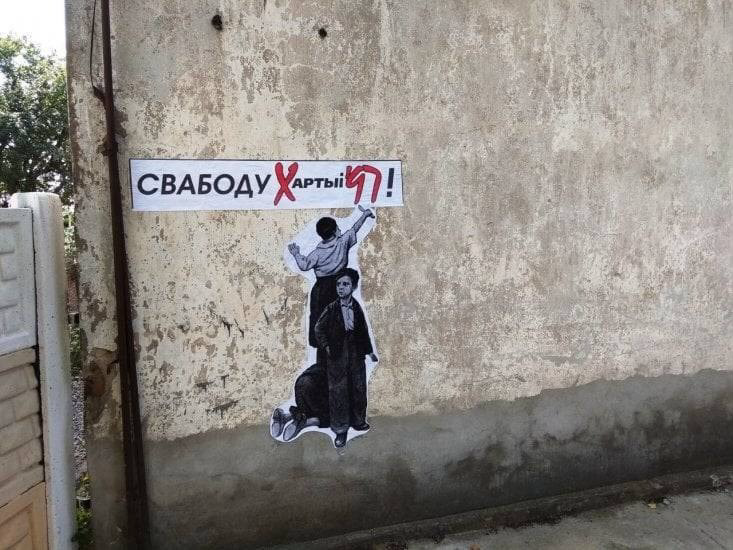More Than Media: Charter’97 Website Turns 25
44- 13.12.2023, 12:58
- 16,320
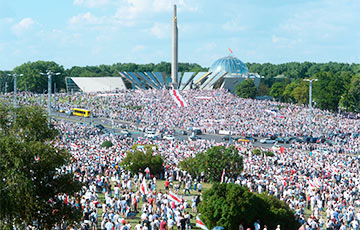
There are millions of us — the ‘Charter people’.
Charter’97, one of the oldest Belarusian information and political online news outlets, celebrated its 25th anniversary this autumn.
On September 11, 1998, the first visitors came to Charter97.org. For 25 years since then, Charter’97 has been at the very center of the most important events in Belarus, one of the first daily telling its readers the truth about what is happening in the country.
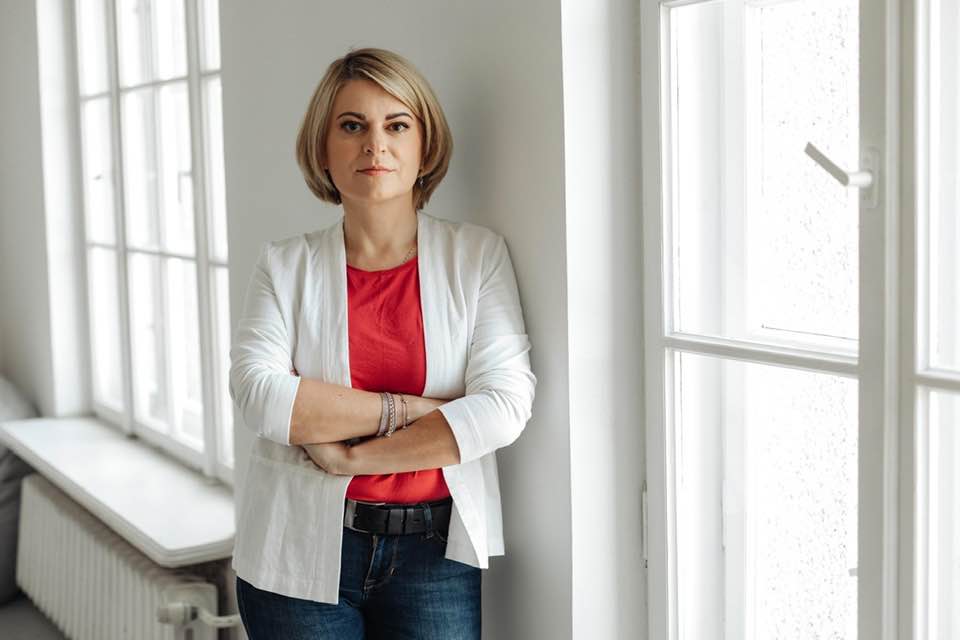
Natallia Radzina, the Editor-in-Chief of Charter97.org, spoke about how the most popular independent news website in Belarus was created, what has happened over the years, and what changes are possible in the near future.
— The Charter’97 website turned 25. Tell us please how the website started and how it was created.
— The Charter’97 Civil Initiative rose in 1997. Its goal was to unite democratic forces in the fight against Lukashenka’s dictatorship and to build a free democratic Belarus.
All the independent media published the Charter'97 declaration on November 10, 1997. It was initially signed by 100 of the most famous political, public and cultural figures: Vasil Bykau, Nil Hilevich, Henadz Karpenka, Stanislau Shushkevich, Ales Bialiatski, Mechyslau Hryb, Yury Khashchavatski, Valer Shchukin, Piotr Martsau, Viktar Ivashkevich, Ulladzimir Matskevich, Mikalai Khalezin, Stanislau Bahdankevich, Yury Khadyka, Mikalai Statkevich, Yury Zakharanka, Mikhail Marynich, Aleh Biabenin, Dzmitry Bandarenka, Andrei Sannikov and many others.
100,000 Belarusian citizens signed the Charter soon after. This was a truly important event in Belarusian political life, because many civil society bodies, political parties, public organizations, and editorial offices of independent media took part. The Press Center of the Charter’97 Organizing Сommittee was created to manage these activities, among other things. Aleh Biabenin became the Press Secretary of the Civil Initiative.
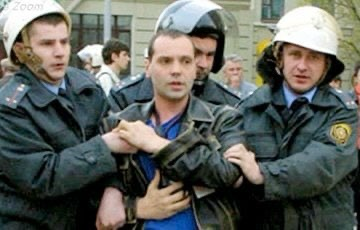
The Press Center published numerous human rights bulletins and leaflets, sent press releases about the activities of Belarusian opposition movements and parties to independent media, and participated in organizing mass protests of the united democratic forces.
At first, the Charter’97 Press Center was located in premises provided by free trade unions on Ploshcha Svabody (“Freedom Square”) in Minsk. There was also the editorial office of the Rabochy newspaper and the front office of the Belarusian People’s University, which was one of the many projects of the Charter’97 Civil Initiative. Then I took part in the work of the Charter’97 Press Center as a volunteer.
The Initiative celebrated its 25th anniversary last year. The website celebrates its anniversary this year.
In the early autumn of 1998, the international coordinator of Charter’97, Andrei Sannikov, proposed creating a website for the Initiative so that we could advance with the times. Naturally, Aleh Biabenin took up the implementation of this idea.
Aleh communicated a lot with the first Belarusian IT specialists (then they were called computer scientists) and understood new technologies, which for many then were something inaccessible and obscure.
Then there were regular meetings with Belarusian IT specialists at the Belarusian State Philharmonic on Yakub Kolas Square. In the 1990s, the most advanced programmers gathered there, spoke their professional language, exchanged experience, and created their first projects. Aleh was a regular participant in these meetings. There he also found programmers who helped develop the site and launch it.
What was the Charter’97 website feature among other websites of organizations that existed at that time? Those pages were static. This, as a rule, was a “showcase” with short information about the organization and some contact information there. Well, the Charter’97 website almost initially became a news and human rights resource, because within two months it switched to daily news updates. Charter97.org is the country's oldest independent news website.
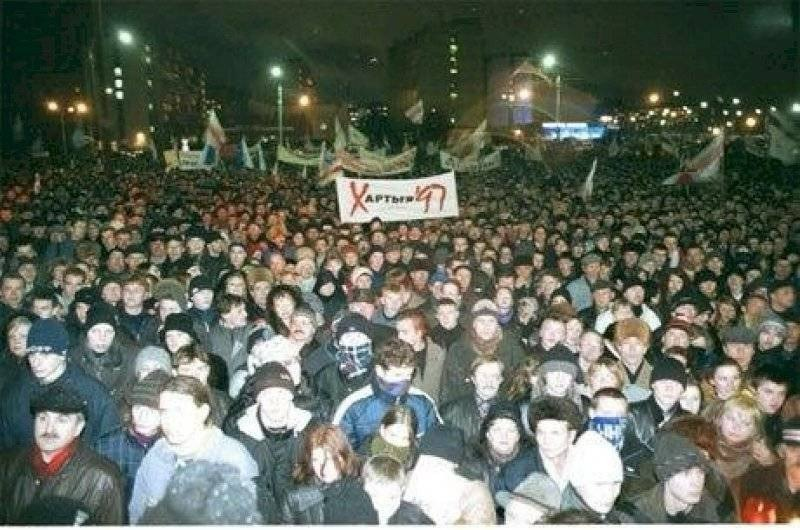
One of the main goals of Charter’97 as an initiative was to protect the rights of people, especially those who were subjected to pressure and repression by dictatorial power. A system of collective security was developed: anyone who was persecuted could count on public assistance (paying a lawyer, receiving transfers to prison, providing legal assistance), and the Charter97.org website played a very important role in this mechanism. Information about arrests and other illegal prosecutions appeared on the website, including in English, and this information could be instantly known throughout the world. This was a real shock for the authorities because the fact that the demonstration was dispersed in Minsk immediately became known to international human rights organizations, Western politicians and the world media. Now it seems natural, but then even ordinary police officers were shocked, because the whole world instantly learned about their actions, and literally the next day, actions of solidarity with the fighting Belarusians took place in many countries.
— How did you understand that the website became top? Was there a moment when you came to work and realized that this was no longer an ordinary net resource?
— I started my work at the website in 2001 at the invitation of Aleh Biabenin. Before that, I worked for the independent publications Imia (“Name”), Svaboda (“Freedom:)
, Nasha Svaboda (“Our Freedom”), Naviny (“News”), Narodnaia Volya (“People’s Will”). These newspapers were closed one by one. Officials bombarded them with lawsuits, and the state-controlled courts closed one publication after another. It became clear that the Internet was becoming a promising future for the work of an independent journalist.
By this time, the website had transformed from a just civil initiative page into a real independent news outlet. Only Editor-in-Chief Aleh Biabenin was deciding on the information policies of the website.
It was a well-promoted, well-known resource, not only in Belarus but also throughout the territory of the former USSR. All journalists in the country were already using it, because it was updated very quickly. There was really interesting information there and many Belarusians were reading it.
Aleh had already made this website a top one by 2001 thanks to the very well-selected content. There was a chronicle of the protests that took place in Belarus at that time, and human rights information, and journalistic investigations about corruption and crimes of the regime.
Charter’97 was standing at the origins of the investigations into the kidnappings of Belarusian opposition leaders in 1999–2000s. The journalists wrote a lot about the direct involvement of the authorities in the murders of Viktar Hanchar, Anatol Krasouski, Yury Zakharanka, Henadz Karpenka, and journalist Dzmitry Zavadski.
When I came, it was already a web portal with its own face, with its own position, solid and committed. It was totally clear to me what kind of resource this was. This perfectly corresponded to my inner convictions, because I wanted to do exactly this kind of journalism.
I had already encountered serious censorship and self-censorship in the editorial offices of independent newspapers — and I didn’t like it at all.
I won’t disclose the identity of people or the publication’s name, but I will say that the last straw for me came with the following situation: I conducted a journalistic investigation and found strong evidence of the authorities’ involvement in corruption and the contract killing of the director of one of the Belarusian factories. However, after the publication of the article, the boss asked me to write a refutation because they began to put pressure on him.
I refused to do this and soon left this newspaper for Charter’97. I knew that Aleh Biabenin would never allow this to happen.
— What kind of person was Aleh Biabenin in general? Why did his death shock people so much? What is the secret of his personality?
— Aleh was very brave. He really wanted to make Belarus free. This was the purpose of his life. What are the goals of many? To take more, comfort, better and best. Of course, we are all human and want to live well, but we must have the highest aims.
Before working in journalism, Aleh was engaged in the shuttle business and even earned very good money for those times. However, then he left it at all to do journalism. He believed that only by telling people the truth can life in the country be changed.
He was ready to risk himself for this. Because even then, in the 1990s, it was clear to us that this government would not lead to any good.
Aleh, by the way, taught me one important thing. I graduated from the Faculty of Journalism of Belarusian State University. And thanks to Aleh, I realized that there is no need to force us journalists into some kind of framework, as they always try to do, saying that “journalism should be above the fray”. That is, it supposedly should not be “politicized”, and the journalist should not have an opinion - like it should be “neutral” and that’s it.
Aleh said that this “neutrality” is essentially immoral under dictatorship. Whatever your profession, you must be on the side of the people whom this dictatorship is trying to destroy.
It was completely obvious to us that, for example, dictatorships always lie. So what shall we do? Shall we publish its propaganda on the website? What's the point?
Charter'97 was often accused of giving the opposition's point of view rather than government propaganda. But that’s nonsense, since, in my opinion, there were always enough Lukashenka topics on the website and in those years we actively used information from BelTA and other official sources. But under dictatorship, as well as during the war that Russia and the Lukashenka regime are waging against Ukraine today, the main task is to highlight those facts and topics that the authorities deliberately hide.
Aleh and I understood even then that our task was to give an alternative point of view to the authorities, because the authorities have a huge propaganda resource, and they still have it. These are all TV channels, all radio stations, this is a huge number of newspapers and websites: this is how it was then, this is how it is now.
Our task is to resist the information pressure that the dictatorial regime puts on people. The fact that the Charter97.org website remains the leading modern information resource indicates that our line enjoys the support from people.
Therefore, Aleh was a visionary in Belarusian journalism. He understood that truly independent media needed to work in this way.
I would also like to add: Aleh had powerful creative energy. This is what I liked most about him. Some visionary people always look further and see in which direction the world will develop as well as technology and media.
He loved life very much... And I will never believe that he could commit suicide. This is simply impossible. I am convinced, and there is a lot of evidence for this, that this is still a political murder.
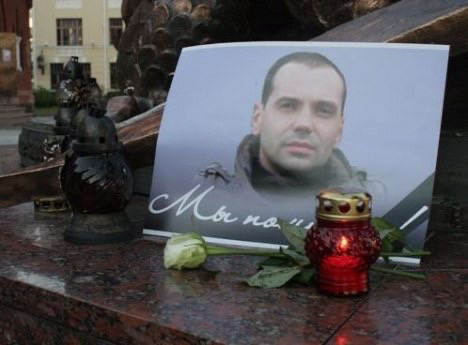
— And have you ever wanted to be “above the fray” for a while, not to get into trouble? The death of the Editor-in-Chief, the destruction of the editorial office in 2010... Have you ever had such thoughts?
— Never. It was always clear that we had to work and we had to continue, no matter how difficult it was.
I had no plans, for example, to leave Belarus and I know that Aleh did not plan to leave anywhere. We understood that we had to fight to the last, while there was at least some opportunity for work.
We worked a lot, we worked hard, we worked without registration, because, as Dzmitry Bandarenka said, partisan detachments are not registered with the Gestapo.
We worked in underground apartments. We had to change our locations very often. We faced shortages of funding working in small teams in which we gathered the best people, and who will forever remain our friends.
We went to all the protests. There were a lot of them in Belarus at that time. We were on duty in the squares after the elections. We were monitoring the human rights situation. We were providing many articles on all the political prisoners. There were political prisoners in Belarus all the time. We also carried out campaigns to defend them.
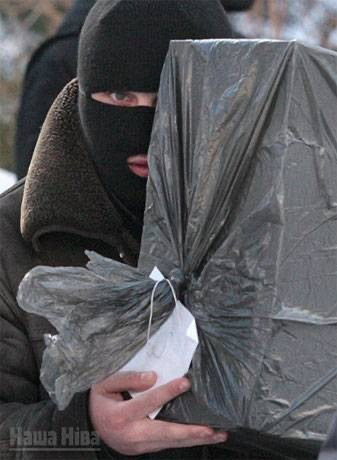
The feature of Charter’97 was that we did not promote exaggerated figures at anyone’s request, but always wrote about those people who really influenced the situation, risking themselves. Fantastic people always gathered in the kitchen of the Charter’97 office: politicians, journalists, authors, directors, human rights activists, and there always was a place for them on the website.
That is, there was a lot of work and, of course, it was exhausting. Sometimes my working day began early in the morning and ended after midnight.
But it was such a drive! And the feeling that you are doing an important, necessary thing.
Is that not pleasant?
I never had any doubts about the path I chose because I am convinced that as long as you live, you must fight for freedom – for you personally and your people.
Aleh's death was a real shock for all of us. And after many years, this pain does not leave each of us. The authorities killed him to intimidate our team and other journalists on the eve of the 2010 presidential elections.
I have never had even a vile thought to give up everything because they killed Aleh. That is, how can I “give up everything”? No, not even for a second, precisely because of Aleh. I know, I am also a human, I am a woman, of course, and I was scared. But I knew for sure that I had to keep going.
At that time, after Aleh’s death, no one from the Charter’97 team left. Everyone stayed, and everyone continued their work.
And, even when I was arrested and thrown into a KGB prison on a criminal case on December 19, 2010, and journalists and website volunteers were arrested and imprisoned for 10-15 days in the Akrestsina prison, where they were under severe pressure, but we did not stop.
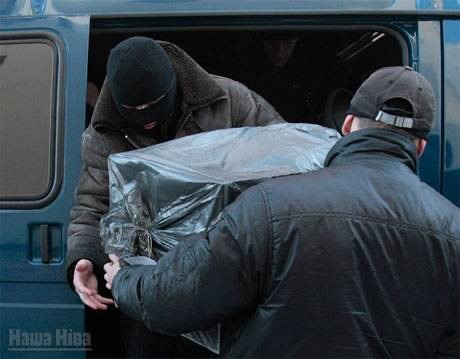
Even after this, the website soon resumed work from abroad, where it began to be updated by our colleagues and friends who were able to leave and avoid arrest.
I remember that the most joyful news for me in the KGB prison was to learn that the website kept working. What worried me most was not that I was in prison, that I was beaten, that I had health problems. What bothered me the most was that the website could stop working.
I remember that I was thinking only about this behind bars. And then, about a week later, an enforcer told me during interrogation: “Natallia Valiantsinauna, the website is not the same without you.” And I think: “My God, what a joy!! That is, it’s working. Hooray!"
This is actually the best news for me.
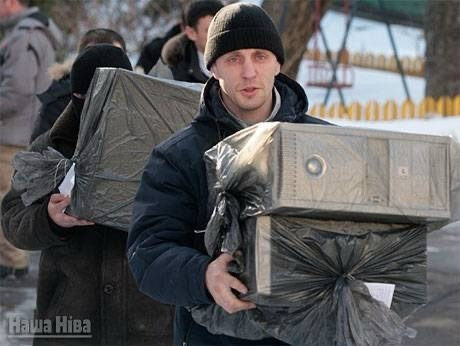
— How exactly did you manage to save the website, despite the destruction of the editorial office and arrests?
— The first person to update the website, while still in Belarus, was Julia Bandarenka, the daughter of the coordinator of the European Belarus civil campaign Dzmitry Bandarenka. It took a lot of courage back then.
Julia and I still work together, and I am grateful to her, just as I am grateful to all my colleagues who then restored the work of Charter’97. I am especially grateful to Pavel Marynich, who helped organize the work of the site’s editorial office in Lithuania when I already arrived in Vilnius.
— After what you said, two images come to mind: information commandos and men of iron. Share a secret: did you specially prepare yourself psychologically somewhere, did you look for the same kind of “special” people?
— In fact, there are no special secrets. We are just people who are highly motivated to fight. We all dream of living in a free democratic Belarus, where no one will put pressure on you and where no one will forbid you to do what you consider a proper thing to do within the framework of democratic legislation, where you can realize yourself, work calmly as a journalist and not be afraid that in any moment they will burst into your editorial office, as it happened with us, take all your equipment, beat you, drag you for interrogation and, in the end, put you in jail.
First of all, the employees of Charter’97 are people who are intolerant of injustice, who do not want to bend to the criminal authorities. And you can always teach people the basics of journalism.
The employees of Charter’97 are a team of like-minded people who share their human qualities and strive to participate in the process of change. Because if a person does not have this desire, then, as a rule, in our conditions they do not make a good journalist: then they easily succumb to pressure, including from the intelligence services.
And then self-censorship, which is so destructive for a journalist, begins. As a result, the journalist ceases to be a journalist. If they are constantly afraid to touch on one topic or another or have a large list of people whom it is dangerous to interview, then they are no longer a journalist.
— Do you think Lukashenka is afraid of Charter’97?
— He is afraid of any truthful information. It was the case from the very beginning. When he came to power in 1994, the first thing he did was take control of the media. All TV channels immediately began working in propaganda mode.
Then in 1996 he closed the only independent radio station in the FM range, Radio 101.2. And all radio stations in Belarus then began to work exclusively for the authorities and provide news exclusively from government sources. And then he began to destroy the press itself, which I already mentioned at the beginning, closing one publication after another. And the newspapers that remained after 2003 were already working according to the new rules. It was clear that they had already been trained enough and were working with a serious degree of self-censorship. This must be recognized, and we must talk about it.
And after 2010, Charter’97 became the first independent website to be hit by repressions such as the murder of the founder and editor-in-chief, and the arrest of myself as editor-in-chief, because I became one after Aleh’s death. Detention of journalists, destruction of the editorial office, forced emigration...
Other news sites have become much more restrained in presenting information regarding what is happening in Belarus.
Therefore, of course, Lukashenka is afraid of journalists and afraid of Charter’97. He is afraid because he understands that we are not under his control.
Why, for example, was I forced to leave Belarus and began to create an editorial office virtually from scratch, first in Vilnius, then in Warsaw? Because I understood that they wouldn’t let me work inside the country, that their task was to take full control of us.
How many times have I been offered to sign papers on cooperation with the KGB... In prison they offered this several times — and very persistently. And I realized that they would continue to do this after I was conditionally free.
After the KGB prison, I was released on my own recognizance, banned from living in Minsk, given a day to pack my things — and I went to Kobryn, where my parents lived. There, I was under constant control. The police came to check on me every day. As soon as articles appeared on the website that they did not find suitable, I was taken to the KGB. But they were not happy with the calls for economic sanctions, which I published because I knew that this was a really effective method of putting pressure on the regime to release political prisoners. My testimony about torture in a KGB prison also aroused rage.
During another interrogation, I asked head of the Kobryn branch of the KGB Dzmitry Navitski to give me a “formulation” so that I could tell the journalists why I could not express my opinion. And the wording was as follows: you are prohibited from expressing a value judgment regarding the situation in the Republic of Belarus.
I realized that these guys will not “get off” me. Their task, even if not to imprison me, is to control me as much as possible. If I don’t obey, I’ll go back to the KGB prison. They told me this in plain text.
I didn’t want to work on a KGB’s short leash, so I fled the country and we continued to work from abroad.
Even today I feel, we all feel, how afraid the authorities are of us, which is why, in fact, we were the first to be blocked back in 2018 just because the authorities were afraid of the huge growth of the Charter’97 audience.
Because we really worked uncensored, told the truth, called a spade a spade. We continue to do this today and remain among the leaders of the Belarusian news Internet.
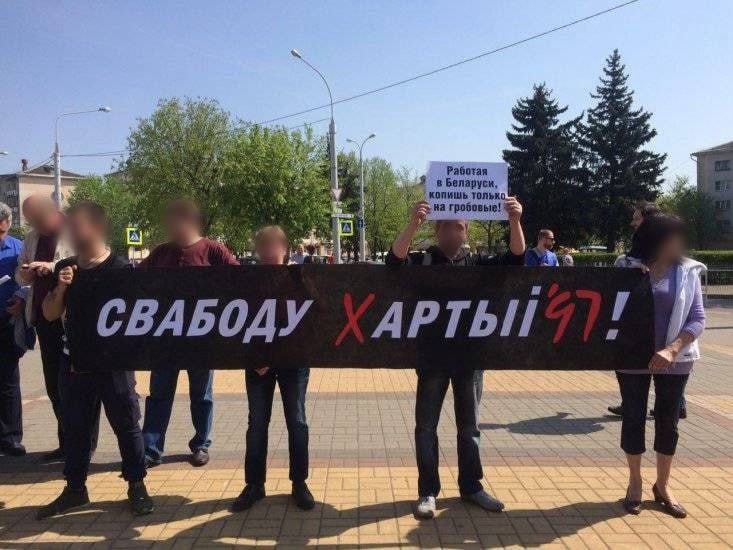
— What is the secret that, despite almost six years of blocking, the site remains a leader?
— There is no special secret. Just talk about what the authorities are trying to hide — and people will read you. By calling a spade a spade, you are simply performing the most important function of a journalist.
People understand that Charter’97 is a defender of their rights and their interests. They understand that the Charter will not remain cowardly silent if something catastrophic happens, if crimes are committed in Belarus.
They are committed now constantly, every day, and it is important not to stop telling people about this, it is important to continue working, it is important to write about what is happening inside the country. It is important to call on the democratic world to respond to what is happening in Belarus.
Today there are thousands of political prisoners in prison. We can't even count their exact number. We can say that there are about 8,000 of them, and maybe even more.
How can you remain silent in this situation and avoid, for example, this topic? Many of our friends ended up in prison. And we must fight for their lives, and for the lives of all other Belarusian heroes, who today are subject to monstrous pressure and whose lives are in danger.
This has always been the task of Charter’97, since 1997: to be on the side of the people and fight for our country.
We also pay a lot of attention to what is happening in neighboring countries, first of all, this concerns the war in Ukraine, because Belarusians understand that our future depends on the outcome of the struggle of the Ukrainian people. We also actively oppose Lukashenka’s and Russian propaganda, by providing truthful information about life in the EU countries, primarily in Poland and the Baltic countries.
I am grateful to every employee of Charter’97 who is doing their job honestly and selflessly today. I am grateful to all the people who were members of our team over the years and did not lose honor or betray us.
— In the huge audience of the Charter, there are probably people of completely different ages and professions. What do you think the typical website reader looks like today?
— I would like to note that Charter’97’s huge audience did not appear spontaneously. This is largely the merit of those people who wrote for the website and were not afraid to give comments and interviews to our journalists. And these are both representatives of the Belarusian intellectual elite and friends of Belarus abroad.
I can’t paint an average portrait of a site reader, but I can assume that these are people who, first of all (just like us), want to see Belarus free.
When they say “Charter people”, it’s not only about us, the editorial staff, but also about all of our readers.
After all, what unites us? The desire to fight and achieve freedom for ourselves and our country.
Our readers and I are like-minded people. I always felt this very well. Since 2001, when I came to work at Charter’97, I felt this close connection with the readers. How similar we really are, how connected we are by common life principles.
We have always had a very active audience. I saw this, and not only thanks to the forums or comments on the Charter’97 website, and the feedback that we constantly receive from our readers. I met many of our readers at protests in Minsk and other cities of Belarus. I meet them today in all countries wherever I go.
There is a feeling that the Charter is such a big friendly family consisting of hundreds, thousands, millions of relatives.
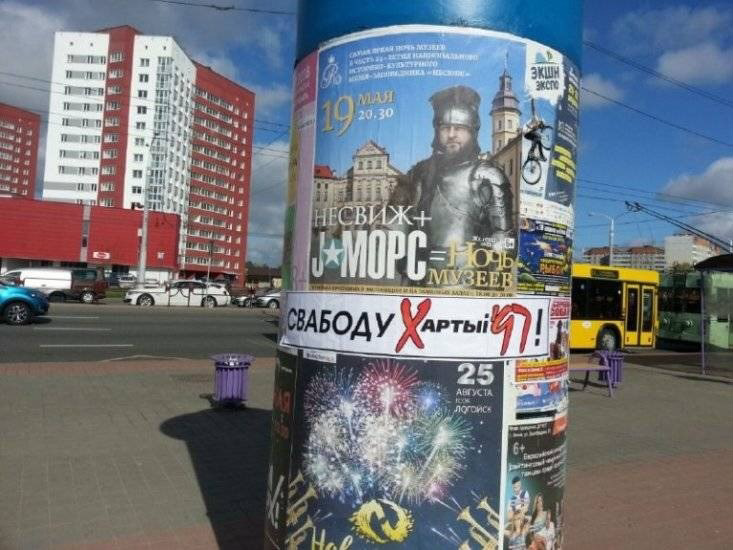
— Were there any interesting stories when readers suddenly recognized you on the street? Or did you recognize someone as your reader?
—This happens all the time. There were a lot of such cases.
These were always such joyful meetings when people just hug you like an old friend. That’s why I say that we are all close in spirit, as if “of the same blood.”
Of course, I am always very happy when people come up to me and say: “Thank you and your team for the work you do.”
This is really very important, and it seriously supports all journalists and employees of the Charter’97 website.
I remember being surprised when the legendary Zbigniew Brzezinski, a famous American politician and geostrategist, said at a meeting with me that he was reading Charter’97, and the head of Barack Obama’s election campaign on new media, Joe Rospars, said that he taught his activists using works of the Belarusian website Charter97.org as an example.
In the KGB prison where I was held, all the guards read the Charter, and some even shared information.
— What was the most unexpected moment of meeting with your readers?
— On the Square in 2010.
Of course, I was on the Square on December 19, 2010. Before I was arrested directly at the editorial office, I was first beaten in Independence Square, where that evening there was a mass protest against the falsification of the presidential elections.
I remember that I fell under the feet of the riot police, and was beaten and miraculously pulled out of there. My friends took me to the ambulance and suddenly someone said: “Oh, Charter is coming!” And then the people parted, a corridor formed, I walked through it and people applauded. I remember this applause all my life. Even now, when I recall this, there are tears in my eyes.
— In 2020, during mass protests in Belarus, a small but interesting rebranding took place: “Charter’97” became “Charter’97%”. What was this connected with?
— We initially believed in the magical power of the number 97 (laughs) and it worked in 2020.
People began to notice that the numbers coincided: the number 97 in the name of the site and the figure 97%, which was given by independent media in 2020 as the percentage of the population opposing the Lukashenka regime.
Of course, this is also the result of our work — that in 2020 the entire Belarusian people actually rebelled against the dictator.
And then we became the “Charter’97%”. I am convinced that even today Lukashenka does not have the support of the people.
I think that apart from some completely brutalized law-enforcers and stupid officials, there is not a single rationally thinking person who will support the elderly dictator. He still remains “Sasha the 3%”, but with the Kremlin’s support.
— What, besides percentages, has changed on the site over these 25 years? What remains the same?
— Everything around us is changing: it is natural that information resources also change. Media is perhaps the most dynamically developing area. We must keep up with time.
And, of course, we are now not only a news site: we are present on all social media, we create our own YouTube programs, we are active on Telegram, Instagram, TikTok, Facebook, and Twitter.
Of course, there is not always enough strength to develop in so many directions. Because it is still quite difficult to find funding for a Belarusian independent Internet resource. But, nevertheless, we try to keep up with the times.
But our unchanging conviction is that we must fight for freedom in our country. We cannot remain on the sidelines, we cannot be “above the battle.”
We must do everything possible and conduct active information work, especially now, both for Belarusians within the country and abroad. After 2020, hundreds of thousands of people left Belarus, and our task is to make sure that they do not forget about their country, so that they continue to fight for political prisoners, of whom there is a huge number in Belarusian prisons today, so that they demand that the West introduce effective sanctions against the regime, so that they continue to remain Belarusians even in emigration.
At the same time, we must continue to work for people inside the country, because they must receive truthful information about what is happening in Belarus, they must understand that they are not alone, that they are not abandoned, that the struggle continues.
This has remained unchanged. And as long as Charter’97 exists, this will always be the case.
I am very grateful to everyone who provides financial assistance to the Charter97.org website, both our major partners and each of our readers who provide us with support through PayPal and through the Charter’97 fund account. Only thanks to your help we are able to fulfill our mission.
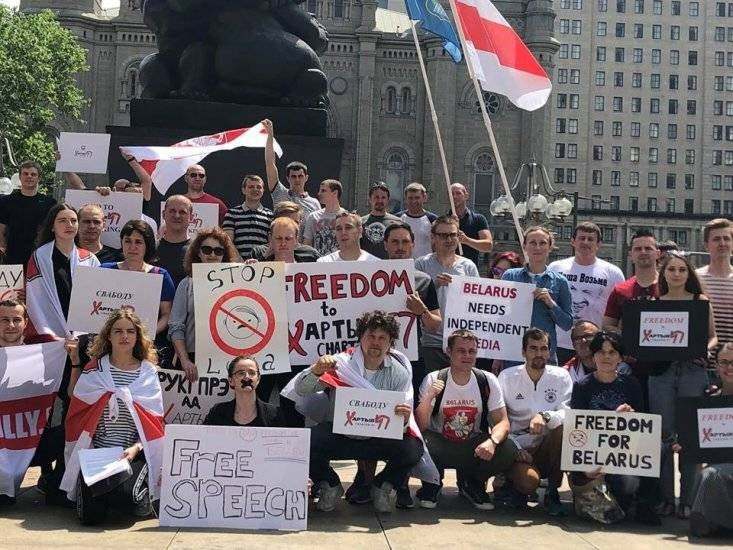
— How do you see the return of Charter’97 to Belarus? What events must occur for this to happen?
— I cannot name any specific scenarios now, but I am convinced that the Lukashenka regime, like the Putin regime, has no prospects. These two regimes are now on the path of self-destruction, and are very actively involved in the process of suicide.
I don’t think they will survive the war that both are waging against Ukraine today. I am sure that this will invariably lead to the collapse of both regimes.
And this will happen, perhaps, in the near future. I don’t think they (Lukashenka and Putin — edit.) have much time left.
I think in a year or two, interesting events await us. We will have a serious chance for change.
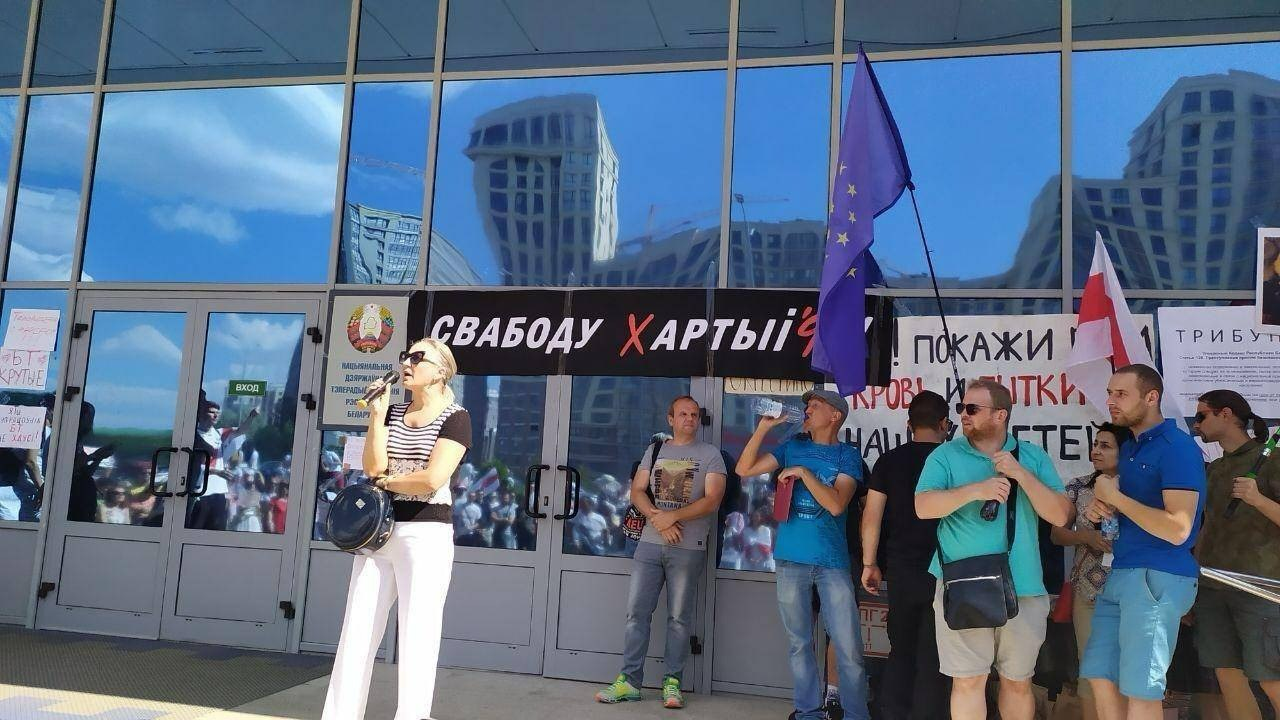
— How do you see the future of the Charter’97 website in a free Belarus?
— I dream that the site will return to Minsk. I dream that there would be an editorial office for Charter’97, and that there would be regional branches in all the six regions in Belarus.
I dream that Charter’97 will be one of the leading independent media in a free and democratic Belarus.
I really want to work in my country and for my country.
